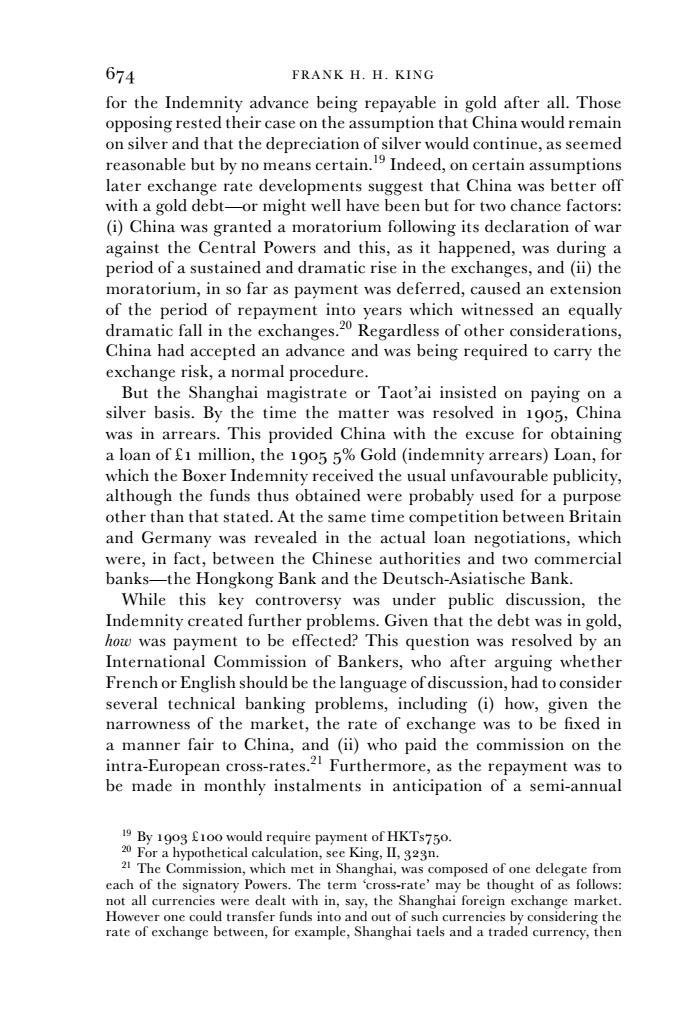正在加载图片...

674 FRANK H.H.KING for the Indemnity advance being repayable in gold after all.Those opposing rested their case on the assumption that China would remain on silver and that the depreciation of silver would continue,as seemed reasonable but by no means certain.19 Indeed,on certain assumptions later exchange rate developments suggest that China was better off with a gold debt-or might well have been but for two chance factors: (i)China was granted a moratorium following its declaration of war against the Central Powers and this,as it happened,was during a period of a sustained and dramatic rise in the exchanges,and(ii)the moratorium,in so far as payment was deferred,caused an extension of the period of repayment into years which witnessed an equally dramatic fall in the exchanges.20 Regardless of other considerations, China had accepted an advance and was being required to carry the exchange risk,a normal procedure. But the Shanghai magistrate or Taot'ai insisted on paying on a silver basis.By the time the matter was resolved in 1905,China was in arrears.This provided China with the excuse for obtaining a loan of fi million,the 1905 5%Gold (indemnity arrears)Loan,for which the Boxer Indemnity received the usual unfavourable publicity, although the funds thus obtained were probably used for a purpose other than that stated.At the same time competition between Britain and Germany was revealed in the actual loan negotiations,which were,in fact,between the Chinese authorities and two commercial banks-the Hongkong Bank and the Deutsch-Asiatische Bank. While this key controversy was under public discussion,the Indemnity created further problems.Given that the debt was in gold, how was payment to be effected?This question was resolved by an International Commission of Bankers,who after arguing whether French or English should be the language of discussion,had to consider several technical banking problems,including (i)how,given the narrowness of the market,the rate of exchange was to be fixed in a manner fair to China,and (ii)who paid the commission on the intra-European cross-rates.21 Furthermore,as the repayment was to be made in monthly instalments in anticipation of a semi-annual 19By 1g03 1oo would require payment of HKTs750. 20 For a hypothetical calculation,see King,II,323n. 21 The Commission,which met in Shanghai,was composed of one delegate from each of the signatory Powers.The term 'cross-rate'may be thought of as follows: not all currencies were dealt with in,say,the Shanghai foreign exchange market. However one could transfer funds into and out of such currencies by considering the rate of exchange between,for example,Shanghai taels and a traded currency,then674 FRANK H. H. KING for the Indemnity advance being repayable in gold after all. Those opposing rested their case on the assumption that China would remain on silver and that the depreciation of silver would continue, as seemed reasonable but by no means certain.19 Indeed, on certain assumptions later exchange rate developments suggest that China was better off with a gold debt—or might well have been but for two chance factors: (i) China was granted a moratorium following its declaration of war against the Central Powers and this, as it happened, was during a period of a sustained and dramatic rise in the exchanges, and (ii) the moratorium, in so far as payment was deferred, caused an extension of the period of repayment into years which witnessed an equally dramatic fall in the exchanges.20 Regardless of other considerations, China had accepted an advance and was being required to carry the exchange risk, a normal procedure. But the Shanghai magistrate or Taot’ai insisted on paying on a silver basis. By the time the matter was resolved in 1905, China was in arrears. This provided China with the excuse for obtaining a loan of £1 million, the 1905 5% Gold (indemnity arrears) Loan, for which the Boxer Indemnity received the usual unfavourable publicity, although the funds thus obtained were probably used for a purpose other than that stated. At the same time competition between Britain and Germany was revealed in the actual loan negotiations, which were, in fact, between the Chinese authorities and two commercial banks—the Hongkong Bank and the Deutsch-Asiatische Bank. While this key controversy was under public discussion, the Indemnity created further problems. Given that the debt was in gold, how was payment to be effected? This question was resolved by an International Commission of Bankers, who after arguing whether French or English should be the language of discussion, had to consider several technical banking problems, including (i) how, given the narrowness of the market, the rate of exchange was to be fixed in a manner fair to China, and (ii) who paid the commission on the intra-European cross-rates.21 Furthermore, as the repayment was to be made in monthly instalments in anticipation of a semi-annual 19 By 1903 £100 would require payment of HKTs750. 20 For a hypothetical calculation, see King, II, 323n. 21 The Commission, which met in Shanghai, was composed of one delegate from each of the signatory Powers. The term ‘cross-rate’ may be thought of as follows: not all currencies were dealt with in, say, the Shanghai foreign exchange market. However one could transfer funds into and out of such currencies by considering the rate of exchange between, for example, Shanghai taels and a traded currency, then